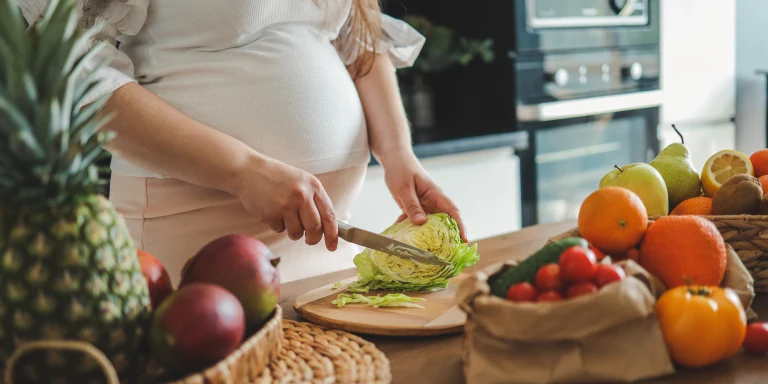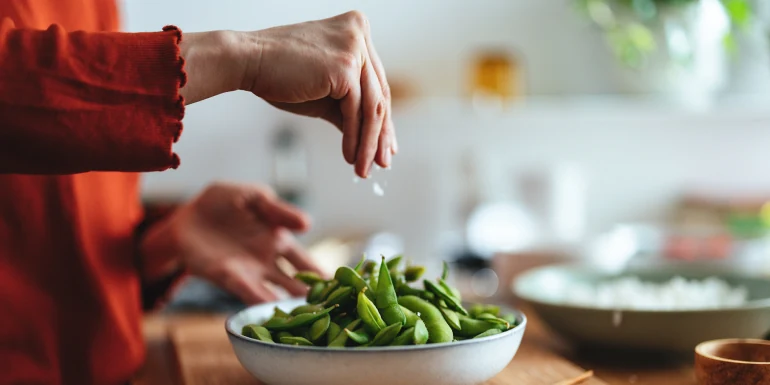
Nutrition during pregnancy
What can I eat when I’m pregnant and what foods should I avoid? Are coffee, eggs, cheese and tuna safe during pregnancy? Find out how to eat healthily during pregnancy.
Pregnancy: why watch what you eat?
During pregnancy, healthy eating is particularly important. Pregnant women need additional minerals, proteins, trace elements and vitamins. A balanced diet during pregnancy contributes to your well-being and the healthy development of your baby.
Nutrition during pregnancy: Calorie requirements
Your calorie requirements increase slightly over the course of your pregnancy. In the first trimester, you need roughly the same number of calories. In the second trimester, you need around 250 calories more per day. In the third trimester, you need an extra 500 calories per day.
What should you not eat during pregnancy?
There are certain foods you should avoid when you’re pregnant. Below, we explain which foods are not recommended during pregnancy:
Fish during pregnancy
Raw fish should be avoided during pregnancy. Why? Because it may contain listeria. Listeria is a type of bacteria that can be very serious for pregnant women and unborn babies. A listeria infection can cause miscarriage or premature birth in some cases.
So you should avoid eating sushi, sashimi and fish carpaccio while you’re pregnant. Avoid cold-smoked and heavily salted fish such as herring fillets, smoked salmon and anchovies. You should also stay away from predatory species such as eel, ocean perch and tuna as these contain high levels of methylmercury, which may impair your baby’s neurological development.
Meat during pregnancy
During pregnancy, avoid raw meat as this may contain listeria, a type of bacteria. There is also a risk of toxoplasmosis, which is an infection caused by a parasite sometimes found in raw or undercooked meat. Toxoplasmosis can lead to miscarriage or organ damage in unborn babies. You should therefore avoid infection and stay away from products such as salami, steak tartare, Cervelat sausage, bloody steak and raw minced meat, carpaccio, raw salt meat products (Kassler pork, smoked meat), meat salad without preservatives, spreadable raw sausage (Teewurst and Mettwurst) and cold-smoked meats (Parma ham, Serrano ham and Katenschinken ham).
You should only consume red meat in moderation during pregnancy as it can play a role in the development of gestational diabetes. Red meat includes pork, beef and lamb. But you don’t have to give it up entirely: red meat contains high levels of iron and helps you to meet your iron requirements. As you need more iron during pregnancy, it’s difficult to get enough from food alone. This is especially the case if you don’t eat meat or if you have low blood iron levels. If this is the case, you should seek advice from your gynaecologist.
If you drink alcohol during pregnancy, it passes into your baby’s bloodstream. Potential consequences include neurological disturbances, severe birth defects, kidney damage or heart defects. You should therefore avoid alcohol entirely while pregnant. Even small amounts often cause lifelong damage to the child. Some healthy and tasty alternatives include grape juice spritzer, cherry and banana juice or non-alcoholic sparkling wine – so you won’t feel left out when others are clinking glasses.
You should also check whether any medications you take contain alcohol and, if they do, be sure to consult your gynaecologist.
Fruit and vegetables during pregnancy
When should I be careful with fruit and vegetables while pregnant? Fruit and vegetables are important for a balanced diet during pregnancy. You should, however, avoid the following:
- Ready-made salads (raw and cut salads)
- Unwashed raw vegetables
- Salads and antipasti from open containers/displays
- Pre-packaged fruit from refrigerated display cases
Unwashed or cut and pre-packaged fruit and vegetables are sometimes infested with listeria. This is a type of bacteria that can be very serious for pregnant women and unborn babies, in particular. There is also a risk of salmonella infection. Salmonella is a type of bacteria that causes gastro-intestinal complaints, fever and shivers. The illness is unpleasant but is usually harmless. However, severe cases can cause a lack of nourishment to the unborn baby, premature birth or miscarriage.
Cheese, eggs and milk during pregnancy
During pregnancy, avoid unpasteurised milk and products such as unpasteurised cheese made from milk that hasn’t been heated. These don’t stay fresh for as long as pasteurised products and may contain germs that are dangerous for pregnant women and unborn babies. Pasteurised milk, which has been heated and cooled, on the other hand, is safe. You should also avoid raw eggs during pregnancy, as they sometimes contain salmonella. The list below contains foods you should ideally avoid during pregnancy:
- Soft-serve ice cream
- Undercooked fried or scrambled eggs, raw eggs or dishes prepared from these (mayonnaise, tiramisu, chocolate mousse)
- Unpasteurised milk and milk-based products made from it (Parmesan, camembert, gorgonzola)
- Sliced and soft cheeses made from unpasteurised milk, sour milk cheese (Harzer), cream cheese sold opened and pickled cheese
Please note: this is not an exhaustive list.
A vegetarian diet is considered safe during pregnancy. Vegetarians generally get all the important nutrients they need during pregnancy if they eat eggs and dairy products. Occasionally, however, they may suffer from iron deficiency, with symptoms such as pain when swallowing or hair loss.
Conversely, experts vary in their views of a vegan diet during pregnancy: avoiding milk and eggs often leads to a lack of vitamin B12. Even with a strictly vegetarian diet during pregnancy, the amount of nutrients such as vitamin B12, protein, calcium and zinc is sometimes too low.
It is therefore essential that you consult a healthcare professional if you are following a vegetarian or vegan diet during pregnancy. They may recommend that you take a dietary supplement.
Sweet treats during pregnancy
There’s no need to avoid sweet treats entirely during pregnancy. It’s better for you and your child, though, if you go easy on cakes, ice creams and mousses. The same goes for chocolate: a small amount a day during pregnancy is no problem. But try to avoid eating more, even if you have a craving for sweets. You should also avoid sugary drinks.
Too much sugar can be harmful for both mother and baby. If the expectant mother develops gestational diabetes, this will increase the risk of various illnesses and infections. It also raises the likelihood of a premature birth. Gynaecologists or midwives generally carry out a glucose test in the 25th week of pregnancy to screen for gestational diabetes. If this goes untreated, the unborn baby grows faster than average. This often leads to birth complications for the mother and metabolic problems in the newborn.
Expectant mothers don’t have to give up coffee entirely. The Swiss Society for Nutrition recommends a maximum caffeine intake of 200 milligrams per day, which is around two cups of filter coffee or three cups of espresso. Consuming more than this may lead to growth delays in unborn babies. Miscarriage is also possible. Recent studies even suggest that just two cups of coffee a day can have a negative impact on unborn babies and that coffee drinkers have lighter babies on average.
Bear in mind that other foods and drinks such as cola, green tea, black tea, dark chocolate and whole milk chocolate contain caffeine.
What can you eat during pregnancy?
A balanced diet during pregnancy will ensure that you and your baby get all the important nutrients you need. The list below contains foods and drinks suitable for a varied and balanced diet during pregnancy:
- Opt for seasonal, local and organic foods to avoid additional exposure to pesticides and chemical fertilisers as far as possible.
- Make sure you drink enough fluids. In the early weeks of pregnancy, the blood vessels dilate due to the increase in oestrogen, so it’s important that you drink enough to stabilise your circulation during this time. This is especially the case if you repeatedly suffer from low blood pressure. 2.5 litres per day is recommended. Drink natural mineral water, diluted vegetable and fruit juices or unsweetened pregnancy teas.
- Opt for unsaturated fatty acids and polyunsaturated fatty acids. These can be found in vegetable fats and oils such as sunflower, rapeseed, soybean and olive oil as well as cold-water fish like mackerel, herring or salmon.
- Oily saltwater fish such as mackerel, herring and salmon provide many important omega-3 fatty acids. Ideally, eat fish two times per week during pregnancy. It’s important to make sure the fish is cooked thoroughly to avoid a listeria infection.
- Yoghurt is a good source of protein and calcium during pregnancy. Fortunately, shops only sell yoghurt made from pasteurised milk. This also applies to cream cheese and quark. So you can eat these milk products safely during pregnancy, ideally three times a day. When choosing a yoghurt, pay attention to the sugar content and opt for unsweetened natural yoghurt. Pasteurised milk also contains high levels of protein and calcium.
- Low-fat meat helps you to get all the iron and vitamin B12 you need during pregnancy. Poultry is a good choice, for example. Make sure all meat is well cooked. Eat a maximum of 450 g of lean meat per week. Some good alternatives to animal protein are pulses, tofu or Quorn. Tip: vitamin C helps your body absorb iron from food, so drink a glass of water with lemon juice with every meal.
- Eat five servings of fruit and vegetables a day during pregnancy. One serving is around 120 g. Wash fruit and vegetables thoroughly to prevent salmonella or listeria infection. What vegetables are particularly recommended during pregnancy? Fruit and vegetables are an essential part of a balanced diet during pregnancy. They also contain dietary fibre, which has a positive effect on digestion. Kale and red cabbage are also rich in folic acid. This nutrient is especially important for pregnant women.
- Eat a serving of grains and/or potatoes with every meal during pregnancy. Grains such as rice contain dietary fibre, vitamins, secondary plant products and minerals. Opt for pasta and bread made from wholegrains.
- Make sure you get plenty of fibre in your diet: dietary fibre is a fibre-rich component of plant foods such as fruit, vegetables and pulses. It keeps you feeling full for a long time and aids digestion. This is especially important during pregnancy, when the intestines work more slowly, which often leads to digestive problems. High-fibre foods include almonds, wheat bran, dried figs, rye-wheat bread, white beans (cooked), peanuts, wholegrain rice, apples and lettuce.
Eating spicy food during pregnancy is perfectly fine. You might find that you are more sensitive to spicy food than normal, so enjoy it in moderation. By the way, small amounts of ginger can even help some expectant mothers with morning sickness.
Tips for nutrition during pregnancy
A healthy diet during pregnancy is one that is full of variety. But what else should you consider?
- Organisation: you don’t need to completely change your diet or stick to a special diet while you’re pregnant. The main thing is ensuring a balanced diet with seasonal and local products. Ideally, these are free from additives and harmful substances. You should also pay attention to the following four points to make sure you have the optimal diet during pregnancy:
- Avoid eating too much or too little over a long period of time.
- Make sure you eat a varied diet. Eat less fat, but more protein and carbohydrates.
- Drink at least 2.5 litres per day.
- Make sure you are getting enough vitamins, minerals and trace elements. Ideally, consult your gynaecologist.
Create a meal plan for your pregnancy. This will help you get used to the adjustment. Use the above points as a guide and record what meals you eat and when. A checklist can also help you maintain a healthy diet during pregnancy. Make a note of which foods to avoid and which you can enjoy occasionally. Add the foods that you can eat without restriction for a healthy diet during pregnancy.
- Regularity: you may feel nauseous after eating. If you do, eating regularly will help: eat around five or six small servings per day during pregnancy. This can also help to prevent other forms of pregnancy discomfort such as heartburn, cravings and digestive problems.
- Hygiene: make sure you observe good hygiene when handling food during pregnancy: wash your hands before cooking and clean fruit and vegetables thoroughly before you prepare them.
Good to know: there are lots of delicious recipes waiting for you in the Helsana Coach App to support you with nutrition during pregnancy.
Food supplements during pregnancy
You need more nutrients during pregnancy. If you choose your food carefully, you will usually consume sufficient amounts of almost all the nutrients you need.
The Swiss Federal Office of Public Health recommends that women who want to conceive as well as pregnant women take 400 micrograms of folic acid each day. Start before you get pregnant and take the folic acid in the form of tablets or capsules at least until the end of the 12th week of pregnancy. This decreases the risk of your child developing a neural tube defect.
It’s best to discuss with your gynaecologist whether or not dietary supplements make sense for you during pregnancy. Overdosing on vitamins A, D and E and the trace elements manganese, iodine and iron is always an unnecessary risk. This means you should never take dietary supplements containing these substances without consulting a professional
Healthy eating is essential for pregnant women and unborn children. A varied and balanced diet supports the development of your baby and your well-being during pregnancy. There is a huge selection of foods you can eat without any problems, ranging from fresh fruit and vegetables to wholegrain products. Try out different recipes and enjoy your pregnancy to the full.

The specialist provided the editorial team with advice and input for this article. Sonja Signer (qualified nurse) works for the Helsana health consultation service. She helps customers on issues to do with prevention and health promotion.


Newsletter
Find out more about current health issues every month and get all the information you need about our attractive offers from all Helsana Group companies * delivered by e-mail to read whenever it suits you. Our newsletter is free of charge and you can sign up here:
We did not receive your information. Please try again later.
* The Helsana Group comprises Helsana Insurance Company Ltd, Helsana Supplementary Insurances Ltd and Helsana Accidents Ltd.